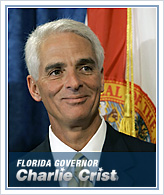FAQ
Listed below you'll find frequently asked questions regarding Florida's economic recovery efforts.
Q: What is the American Recovery and Reinvestment Act?
A: Commonly known as the federal stimulus bill, the American Recovery and Reinvestment Act of 2009 (ARRA), signed into law by The President on February 17, 2009, addresses our present economic crisis and builds a foundation for our future. It helps struggling families, creates and saves jobs and promotes economic recovery and growth.
Governor Crist immediately established a Stimulus Working Group to plan for implementation in Florida.
The federal government has established a website (www.recovery.gov) to provide transparency and accountability for the American Recovery and Reinvestment Act. It includes the full text of the Act, timelines for federal actions and recipient reporting, news releases, links to federal agency websites for specific stimulus program information, tracking states’ progress and other useful information. (Back to Top)
Q: How will the federal stimulus package help Florida?
A: As Governor Crist stated in his certification letter to the President, "Now, at a time when many families are facing extraordinary difficulties due to the decline in the economy, it is critical that we ensure that Floridians are able to access the federal resources made available by the American Recovery and Reinvestment Act of 2009."
Florida expects to receive approximately $13 billion over the three years of the program. More funding is possible if Florida's state agencies, local governments, not-for-profits, businesses and schools are successful in competitive grant programs.
ARRA funding is allocated in various ways, including extensions of existing benefits such as unemployment compensation, grants based on population formulas, competitive grants and discretionary grants. Examples of the types of programs and funding are:
- Stabilization funding which goes directly into the state budget to prevent cuts to essential government services and teacher layoffs.
- Extensions or enhancements to existing programs administered at the state level to meet current needs, such as additional weeks of coverage for unemployment compensation or increases in food stamp benefits.
- Funding distributed to Regional Workforce Boards for adult job training, summer youth programs and job placement assistance.
- Funding to the state’s Department of Environmental Protection so it can make grants to local governments to reduce diesel emissions.
- Head Start funding that goes directly to local agencies.
- Criminal justice grants, allocated by formula, that go to both state and local public safety agencies.
- Competitive grant programs that make investments for the future and are designed to transform the state economy. These include health information technology to reduce health care costs and broadband expansion for Internet access by the unserved and underserved.
Individuals - The economic recovery plan provides help to those needing assistance with job loss, health care costs and other issues. Through a wide array of tax credits, the Act also provides a boost to individuals looking to buy their first home, purchase a new vehicle, lower energy bills or pursue a higher education.
Businesses - Businesses will benefit from a number of tax credits and other incentives, federal and state loans and loan guarantees to help them grow and create new jobs, and financing to promote energy independence. As critical partners in transforming Florida, businesses will compete for contracts being issued by the public sector for its stimulus and recovery projects.
For further information about the various programs, see the State and Local Projects section of this website or the "Florida Funding Summary" in the Documents section. (Back to Top)
Q: When will the stimulus funding get to Main Street?
A: It is crucial to commit these funds quickly and responsibly to create jobs and help families and businesses in need. Some funding is already flowing into Florida’s economy. The additional unemployment compensation funding will be released to the state by mid-March 2009. Transportation project funding, for example, 50% of the highway funds must be obligated within 120 days and all of the funds within one year or the funds will be reallocated to other states. For each program federal agencies are in the process of establishing dates and deadlines for delivering funds, contracts, and reporting. (Back to Top)
Q: How is the money distributed? Who decides how the stimulus money is spent?
A: Many of the spending decisions occur at the local level, not in Washington or Tallahassee. For example, school boards will decide how they wish to use education grants. Municipal planning organizations and rural planning organizations will approve their own lists of infrastructure projects.
The Act distributes funds through already established channels whenever possible to expedite its availability. Most funding will flow through the state agency that normally handles that type of funding. For example, funding for meals for seniors will go through the Department of Elder Affairs and funding for road projects will go through the Department of Transportation. Some funds will be disbursed directly to local entities based on pre-existing formulas, such as special education funding to school districts.
Depending on the program, individuals, schools, local governments, not-for-profits, higher education, state agencies and businesses may be eligible for funding. Each of the 100+ programs has its own criteria for eligibility. In many cases, the eligibility criteria are already established under current federal and state statutes and regulations. For some programs, the federal government is writing new regulations and guidance to determine the eligibility and selection process. (Back to Top)
Q: How can I be sure that the funds are spent responsibly and efficiently?
A: Governor Crist is committed that Florida will meet the highest standards of fiscal integrity, transparency and accountability in the administration of ARRA funds. The Act outlined numerous requirements to ensure that the stimulus package money is well spent and includes an unprecedented level of accountability and transparency on both expenditures and results. Requirements include:
- Certification by Governor Crist and local officials that infrastructure expenditures have been fully reviewed and are an appropriate use of tax dollars.
- Public access to contract and grant information, including requests for proposals for competitive grant programs.
- Provisions for federal oversight, reviews and audits, coordinated by a Recovery Act Accountability and Transparency Board.
- Access by federal inspectors and the Recovery Act Accountability and Transparency Board to information needed to ensure accountability at the national level.
The Florida Office of Economic Recovery is required to report the following to the federal government:
- How funds are being used.
- Descriptions and status reports on stimulus-related projects.
- Estimates of jobs saved or created by federal stimulus activities.
- Estimates of tax increases averted because of federal stimulus funds.
This web site will provide continuously updated information on how all stimulus funds are used and the specific status of Florida projects.
In addition, the U. S. Government Accountability Office (GAO) has selected 16 states, including Florida, for an ongoing longitudinal analysis of our use of funds. The states were chosen on the basis of outlay projections, percentage of the U.S. population represented, unemployment rates and changes, and a mix of states' poverty levels, geographic coverage and representation of both urban and rural areas. (Back to Top)
Q: Who can I contact if I suspect there is fraud or abuse of Florida’s stimulus funding?
A: Governor Crist’s Chief Inspector General is coordinating the efforts of state agency inspectors general to investigate alleged misuse of stimulus funding. The office can be reached by calling 850-922-4637 or fax at 850-921-0817. If you wish to file a complaint, go to: http://www.flgov.com/ig_complaint.
For a listing of the Inspector General in the Governor’s agencies, see http://www.flgov.com/ig_igs. At the federal level, federal agency Inspectors General can be located at: http://www.ignet.gov/igs1.html. (Back to Top)
Q: Where can I find information on tax incentives?
A: Most tax incentives in the Act are tied to the federal tax code. The Internal Revenue Service (www.irs.gov) is your best source of information. (Back to Top)
Q: How can I stay up-to-date on Florida’s stimulus efforts?
A: This website is continually being updated with additional information, as we learn more about the federal programs and as we start reporting results. You can also sign up for email updates – see the "Subscribe" button on the home page. (Back to Top)
Q: How is Florida managing its stimulus program?
A: On March 3, 2009, Governor Crist established the Florida Office of Economic Recovery. Working in concert with federal, state and local agencies, the Office is coordinating ARRA efforts in Florida. The Office is responsible for:
- Working with state and local agencies to identify the quickest ways to put stimulus funds to work in Florida
- Working with state and local agencies to identify obstacles to efficient ARRA activities and working to remove those obstacles
- Facilitating the flow of information to all eligible entities about competitive grant opportunities to maximize Florida's share
- Tracking all ARRA funding coming into Florida, whether it is awarded to state and local governments, not-for-profit organizations or private businesses
- Communicating to Florida's citizens and the Legislature on how the state is using Recovery funds, the status of the various projects underway, progress made in jobs retention and creating and investments being made for Florida's future
- Coordinating accountability and transparency efforts with Florida funding recipients and the federal government
The Florida Office of Economic Recovery is headed by Don Winstead, Special Advisor to the Governor for the Implementation of the American Recovery and Reinvestment Act. Staff members for this effort are on loan from state agencies and work daily with representatives from other state agencies to make sure everything possible is being done for Florida's recovery. (Back to Top)
Q: Are there any prohibitions on the use of ARRA funds?
A: The Act specifies that state, local and private entities cannot use federal stimulus funding for a casino or other gambling establishment, aquarium, zoo, golf course or swimming pool. There are restrictions on local school districts and higher education institutions such as prohibiting using ARRA funding for the purchase or upgrade of vehicles or construction of facilities used for athletics. As the federal agencies flesh out the details of their programs, other limitations may be defined. (Back to Top)


















